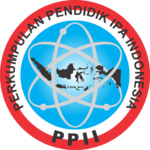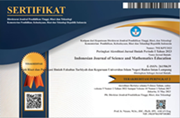The Utilization of Virtual Laboratory in Learning: A Meta-Analysis
Abstract
Keywords
Full Text:
PDFReferences
J. S. Richardson, Science teaching in secondary schools. New Jersey: Prentice-Hall, Inc., 1957.
M. Alteza, “Penerapan model pembelajaran virtual di perguruan tinggi,” Semin. Nas. Identifikasi Mutu Pendidik. Untuk Meningkat. Kualitas Ketahanan Bangsa, pp. 340–346, 2005.
T. Abdjul and N. Ntobuo, “Developing Device of Learning Based on Virtual Laboratory through Phet Simulation for Physics Lesson with Sound Material,” vol. 4531, pp. 105–115.
R. Diani, S. Latifah, Y. M. Anggraeni, and D. Fujiani, “Physics Learning Based on Virtual Laboratory to Remediate Misconception in Fluid Material,” Tadris J. Kegur. dan Ilmu Tarb., vol. 3, no. 2, 2018.
R. Nirwana, “Pemanfaatan Laboratorium Virtual Dan E-Reference Dalam Proses Pembelajaran,” J. Phenom., vol. 1, no. 1, pp. 115–123, 2011.
Widya, R. Rifandi, and Y. Laila Rahmi, “STEM education to fulfil the 21st century demand: A literature review,” J. Phys. Conf. Ser., vol. 1317, no. 1, 2019.
C. R. Huber and N. R. Kuncel, “Does College Teach Critical Thinking? A Meta-Analysis,” Rev. Educ. Res., 2015.
N. Balta, “The Effect of 7E Learning Cycle on Learning in Science Teaching: A meta-Analysis Study,” Eur. J. Educ. Res., vol. 5, no. 2, pp. 61–72, 2016.
H. Y. Liu and C. C. Chang, “Effectiveness of 4Ps Creativity Teaching for College Students: A Systematic Review and Meta-Analysis,” Creat. Educ., vol. 8, no. 06, p. 857, 2017.
E. H. O. B. Jr, R. H. Humphrey, J. M. Pollack, T. H. Hawver, and P. A. Story, “The relation between emotional intelligence and job performance : A meta-analysis,” J. Organ. Behav., vol. 32, pp. 788–818, 2011.
M. . Glass, G.V., McGaw B., & Smith, Meta-Analysis in Social Research. Sage Publications. London: Sage Publications, 1981.
H. Sutjipto, Aplikasi Meta- analisis dalam Pengujian Validitas Item. Yogyakarta: Fakultas Psikologi UGM, 1995.
E. D. Jannati, A. Setiawan, P. Siahaan, and C. Rochman, “Virtual laboratory learning media development to improve science literacy skills of mechanical engineering students on basic physics concept of material measurement,” J. Phys. Conf. Ser., vol. 1013, no. 1, 2018.
B. Bortnik, N. Stozhko, I. Pervukhina, A. Tchernysheva, and G. Belysheva, “Effect of virtual analytical chemistry laboratory on enhancing student research skills and practices,” Res. Learn. Technol., vol. 25, 2017.
L. Ye, N. S. Wong, and J. W. Y. Ho, “Design,Development and Evaluation of Biochemistry Virtual Laboratory for Blended Learning,” GSTF J. Educ., vol. Volume 3, no. 2; 2016, pp. 40–45, 2016.
F. S. Arista and H. Kuswanto, “Virtual physics laboratory application based on the android smartphone to improve learning independence and conceptual understanding,” Int. J. Instr., vol. 11, no. 1, pp. 1–16, Jan. 2018.
U. Klentien and W. Wannasawade, “Development of Blended Learning Model with Virtual Science Laboratory for Secondary Students,” Procedia - Soc. Behav. Sci., vol. 217, pp. 706–711, Feb. 2016.
A. I. Gambari, H. Kawu, and O. C. Falode, “Impact of virtual laboratory on the achievement of secondary school chemistry students in homogeneous and heterogeneous collaborative environments,” Contemp. Educ. Technol., vol. 9, no. 3, pp. 246–263, 2018.
Z. Tatli and A. Ayas, “Virtual laboratory applications in chemistry education,” in Procedia - Social and Behavioral Sciences, 2010, vol. 9, pp. 938–942.
F. D. Syahfitri, B. Manurung, and M. Sudibyo, “The Development of Problem Based Virtual Laboratory Media to Improve Science Process Skills of Students in Biology,” vol. 6, no. June, pp. 64–74, 2019.
A. Swandi, S. Nurul Hidayah, and L. J. Irsan, “Pengembangan Media Pembelajaran Laboratorium Virtual untuk Mengatasi Miskonsepsi Pada Materi Fisika Inti di SMAN 1 Binamu, Jeneponto (Halaman 20 s.d. 24),” J. Fis. Indones., vol. 18, no. 52, pp. 20–24, 2015.
Gunawan, A. Harjono, H. Sahidu, and L. Herayanti, “Virtual laboratory to improve students’ problem-solving skills on electricity concept,” J. Pendidik. IPA Indones., vol. 6, no. 2, pp. 257–264, 2017.
A. Ranjan, “Effect of virtual laboratory on students’ conceptual achievement in physics,” Int. J. Tech. Res. Sci., vol. 2, no. 1, pp. 15–21, 2017.
S. S. Alneyadi, “Virtual lab implementation in science literacy: Emirati science teachers’ perspectives,” Eurasia J. Math. Sci. Technol. Educ., vol. 15, no. 12, 2019.
M. Satsky Kerr, K. Rynearson, and M. Kerr, “Innovative Educational Practice: Using Virtual Labs in the Secondary Classroom,” J. Educ. Online, vol. 1, no. 1, pp. 1–9, 2004.
M. Bajpai and A. Kumar, “Effect of virtual laboratory on students’ conceptual achievement in physics,” Int. J. Curr. Res., vol. 7, no. 02, pp. 12808–12813, 2015.
Ö. SARI AY and S. YILMAZ, “Effects of Virtual Experiments Oriented Science Instruction on Students’ Achievement and Attitude,” İlköğretim Online, vol. 14, no. 2, pp. 609–620, 2015.
B. T. Olufunke, “Effect of Availability and Utilization of Physics Laboratory Equipment on Students’ Academic Achievement in Senior Secondary School Physics,” World J. Educ., vol. 2, no. 5, pp. 1–7, 2012.
A. Hasan, Kamus Besar Bahasa Indonesia. Jakarta: Gramedia Pustaka Utama, 2011.
S. Suryabrata, Psikologi Pendidikan. Jakarta: Raja Grafindo Persada, 2002.
R. Vebrianto and K. Osman, “The Effect of Multiple Media Instruction in Improving Students’ Science Process Skill and Achievement,” Procedia - Soc. Behav. Sci., vol. 15, p. 347, 2011.
E. İnce, F. G. Kırbaşlar, Z. Ö. Güneş, Y. Yaman, Ö. Yolcu, and E. Yolcu, “An Innovative Approach in Virtual Laboratory Education: The Case of ‘IUVIRLAB’ and Relationships between Communication Skills with the Usage of IUVIRLAB,” Procedia - Soc. Behav. Sci., vol. 195, pp. 1768–1777, Jul. 2015.
Y. Zhao, E. Flanagan, H. Abbasi, K. Black, X. Wang, and A. Cardona, “Development of a Virtual Lab in Assistance of a Fluid Mechanics Laboratory Instruction,” in ASME 2019 International Mechanical Engineering Congress and Exposition, 2019, vol. Volume 5:
M. Sarjono and D. Mundilarto, “Development of Physics Lab Assessment Instrument for Senior High School Level,” 2018.
G. Gunawan, A. Harjono, H. Sahidu, L. Herayanti, N. M. Y. Suranti, and F. Yahya, “Using Virtual Laboratory to Improve Pre-service Physics Teachers’ Creativity and Problem-Solving Skills on Thermodynamics Concept,” J. Phys. Conf. Ser., vol. 1280, no. 5, 2019.
G. Gunawan, N. Nisrina, N. M. Y. Suranti, L. Herayanti, and R. Rahmatiah, “Virtual Laboratory to Improve Students’ Conceptual Understanding in Physics Learning,” J. Phys. Conf. Ser., vol. 1108, no. 1, 2018.
O. C. Falode, “EVALUATION OF VIRTUAL LABORATORY PACKAGE ON NIGERIAN SECONDARY SCHOOL PHYSICS CONCEPTS,” 2017.
M. A. Faour and Z. Ayoubi, “The effect of using virtual laboratory on grade 10 students’ conceptual understanding and their attitudes towards physics,” J. Educ. Sci., vol. 4, no. 1, pp. 54–68, 2018.
DOI: http://dx.doi.org/10.24042/ijsme.v3i2.6474
Refbacks
- There are currently no refbacks.
Copyright (c) 2020 Unit Riset dan Publikasi Ilmiah FTK UIN Raden Intan Lampung

This work is licensed under a Creative Commons Attribution-ShareAlike 4.0 International License.

Indonesian Journal of Science and Mathematics Education is licensed under a Creative Commons Attribution-ShareAlike 4.0 International License.




